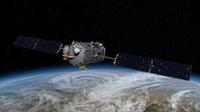-
Robotic jellyfish to patrol oceans, clean oil spills, detect pollutants
Scientists are working on developing life-like autonomous robot jellyfish which will be put in waters around the world; the robot jellyfish would be used for military surveillance, cleaning oil spills, and monitoring the environment
-
-
Movie-like emergency training system for law enforcement
Raytheon’s VIRTSIM law-enforcement training system employs licensed motion-capture technology similar to that used in movies such as “Lord of the Rings,” “Avatar,” and, most recently, “The Avengers”; the system is being offered to the law enforcement community as an affordable, twenty-first century alternative to outdated training practices that do little to replicate real-life situations
-
-
Groundwater depletion in Texas, California threatens US food security
The U.S. food supply may be vulnerable to rapid groundwater depletion from irrigated agriculture; for example, from 2006 to 2009, farmers in the south of California’s Central Valley depleted enough groundwater to fill the U.S. largest man-made reservoir, Lake Mead near Las Vegas — a level of groundwater depletion that is unsustainable at current recharge rates
-
-
Removing CO2 from the flues of coal-fired power plants
The current method of removing the greenhouse gas carbon dioxide (CO2) from the flues of coal-fired power plants uses so much energy that no one bothers to use it; scientists have developed an entirely new catalyst for separating out and capturing CO2, one that mimics a naturally occurring catalyst operating in our lungs
-
-
Explaining uneven rise in sea levels
If there is a global warming trend, one of its consequences would a rise in sea levels, which will require massive mitigation efforts to protect coastal infrastructure; rather than a uniform rise in sea level, however, the records show sea levels rising in some areas and dropping in others; Harvard researchers offer an explanation for this phenomenon
-
-
Solving southwest U.S. water shortage by water cap and trade?
Lake Mead, on the Colorado River, is the largest reservoir in the United States, but users are consuming more water than flows down the river in an average year, which threatens the water supply for agriculture and households; researchers suggest that to solve this imbalance, a water cap-and-trade system, successfully implemented in Australia, should be considered for interstate water trading
-
-
Bios of female terrorists contradict stereotypes: study

Much like their male counterparts, female terrorists are likely to be educated, employed, and native residents of the country where they commit a terrorist act, new research finds
-
-
Groundwater pumping causes sea level rise, canceling out effect of dams
Those in charge of infrastructure protection must now worry about another source of sea level rise: water pumped out of the ground for irrigation, drinking water, and industrial use; this water ends up emptying into the world’s oceans, and scientists calculate that by 2050, groundwater pumping will cause a global sea level rise of about 0.8 millimeters per year
-
-
Groundwater pumping causes sea level rise, canceling out effect of dams
Those in charge of infrastructure protection must now worry about another source of sea level rise: water pumped out of the ground for irrigation, drinking water, and industrial use; this water ends up emptying into the world’s oceans, and scientists calculate that by 2050, groundwater pumping will cause a global sea level rise of about 0.8 millimeters per year
-
-
NASA's new carbon-counting instrument ready for lift-off

Carbon dioxide is the most significant human-produced greenhouse gas and the principal human-produced driver of climate change; new NASA spacecraft will uniformly sample the atmosphere above Earth’s land and ocean, collecting more than half a million measurements of carbon dioxide concentration over Earth’s sunlit hemisphere every day for at least two years
-
-
An 8th grader from Indiana, Massachusetts school team, win 2012 math competition
An 8th grader from Sycamore School Carmel, Indiana won the 2012 Raytheon MATHCOUNTS National Competition; he competed against more than 200 other middle school students in the prestigious academic event; the best and brightest middle school mathematics students engaged in a multi-day competition which included a written exam and culminated in the lightning speed Countdown Round; in the team competition, Massachusetts captured the title of National Team Champion
-
-
An 8th grader from Indiana, Massachusetts school team, win 2012 math competition
An 8th grader from Sycamore School Carmel, Indiana won the 2012 Raytheon MATHCOUNTS National Competition; he competed against more than 200 other middle school students in the prestigious academic event; the best and brightest middle school mathematics students engaged in a multi-day competition which included a written exam and culminated in the lightning speed Countdown Round; in the team competition, Massachusetts captured the title of National Team Champion
-
-
New explosives detection based on micro- and nano-cantilever beam sensors
A team of engineers is investigating micro- and nano-cantilever beam sensors for explosives detection; micro- and nano-cantilever beam sensors offer a distinct advantage in that they are small, very responsive, and very sensitive; their sensitivity and selectivity can also be tuned by modifying the surface treatment
-
-
U.K. robotics R&D receives major boost
U.K. research to develop smart machines that think for themselves received a £16 million boost yesterday thanks to a major partnership between the government and industry. This research includes safe ways of monitoring in dangerous environments such as deep sea installations and nuclear power plants, “nursebots” that assist patients in hospitals, and aerial vehicles that can monitor national borders or detect pollution
-
-
Mass spectrometry for detection of trace quantities of explosives
The detection of trace quantities of explosives is critical to defending civilian populations from terrorist attacks; researchers have developed a method of modifying a commercial electrospray ionization source for ambient detection of explosives on surfaces
-
More headlines
The long view
New Technology is Keeping the Skies Safe
DHS S&T Baggage, Cargo, and People Screening (BCP) Program develops state-of-the-art screening solutions to help secure airspace, communities, and borders
Factories First: Winning the Drone War Before It Starts
Wars are won by factories before they are won on the battlefield,Martin C. Feldmann writes, noting that the United States lacks the manufacturing depth for the coming drone age. Rectifying this situation “will take far more than procurement tweaks,” Feldmann writes. “It demands a national-level, wartime-scale industrial mobilization.”
How Artificial General Intelligence Could Affect the Rise and Fall of Nations
Visions for potential AGI futures: A new report from RAND aims to stimulate thinking among policymakers about possible impacts of the development of artificial general intelligence (AGI) on geopolitics and the world order.
Smaller Nuclear Reactors Spark Renewed Interest in a Once-Shunned Energy Source
In the past two years, half the states have taken action to promote nuclear power, from creating nuclear task forces to integrating nuclear into long-term energy plans.
Keeping the Lights on with Nuclear Waste: Radiochemistry Transforms Nuclear Waste into Strategic Materials
How UNLV radiochemistry is pioneering the future of energy in the Southwest by salvaging strategic materials from nuclear dumps –and making it safe.
Model Predicts Long-Term Effects of Nuclear Waste on Underground Disposal Systems
The simulations matched results from an underground lab experiment in Switzerland, suggesting modeling could be used to validate the safety of nuclear disposal sites.
